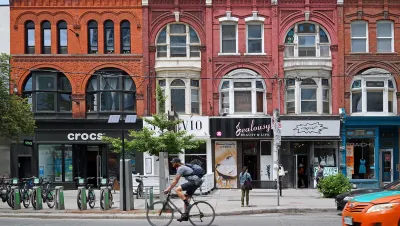A study published recently in the Journal of the American Planning Association finds that mixed-use neighborhoods in Toronto are only delivering benefits to those who can afford to pay a premium.

"A new study by a School of Planning researcher at University of Waterloo shows mixed-use development might be increasing income inequality," according to an article on the CBC News website.
"Data collected between 1991 and 2006 in Toronto showed that housing options in mixed-use zones — those mixing residential and commercial properties — continued to be less affordable than housing in other parts of the city," adds the article.
The researcher is Markus Moos, and he provides several quotes in a press release announcing the new study to explain the implications of the findings: "Walking to a nearby fancy coffee shop is nice but the premium people pay for that luxury means the barista can't afford to live near their job."
The press release and the article both present ideas for how mixed-use neighborhoods can better deliver benefits across the economic spectrum. The press release especially makes it clear that mixed-use neighborhoods are not "inherently misguided."
"What’s needed now is good policy to follow good planning," says Tara Vinodrai, a professor at Waterloo’s Department of Geography and Environmental Management in the press release. "This includes inclusionary zoning, density bonuses linked to affordable housing, affordable housing trusts, and other relevant methods."
FULL STORY: Mixed-use developments make housing more expensive, says study

National Parks Layoffs Will Cause Communities to Lose Billions
Thousands of essential park workers were laid off this week, just before the busy spring break season.

Retro-silient?: America’s First “Eco-burb,” The Woodlands Turns 50
A master-planned community north of Houston offers lessons on green infrastructure and resilient design, but falls short of its founder’s lofty affordability and walkability goals.

Delivering for America Plan Will Downgrade Mail Service in at Least 49.5 Percent of Zip Codes
Republican and Democrat lawmakers criticize the plan for its disproportionate negative impact on rural communities.

Test News Post 1
This is a summary

Test News Headline 46
Test for the image on the front page.

Balancing Bombs and Butterflies: How the National Guard Protects a Rare Species
The National Guard at Fort Indiantown Gap uses GIS technology and land management strategies to balance military training with conservation efforts, ensuring the survival of the rare eastern regal fritillary butterfly.
Urban Design for Planners 1: Software Tools
This six-course series explores essential urban design concepts using open source software and equips planners with the tools they need to participate fully in the urban design process.
Planning for Universal Design
Learn the tools for implementing Universal Design in planning regulations.
EMC Planning Group, Inc.
Planetizen
Planetizen
Mpact (formerly Rail~Volution)
Great Falls Development Authority, Inc.
HUDs Office of Policy Development and Research
NYU Wagner Graduate School of Public Service





























